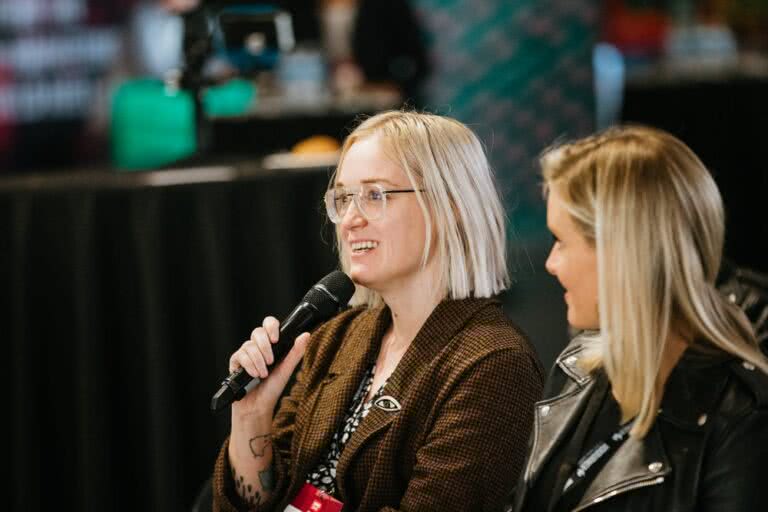A roundtable group discussion can be the highlight of your conference or corporate event. Attendees love roundtable meetings because everyone can participate in the conversation, promoting engagement. To avoid a chaotic free-for-all or yawn-inducing session, follow our group discussion tips and tricks, and set yourself up for hosting a successful roundtable event.
Define your goals
Your roundtable discussion can be an engaging alternative to a keynote speaker. However, it’s important to know exactly what you want your attendees to gain from the format, and whether a roundtable is the best way to achieve this. Establishing your goals upfront will help you run a smoother event and can become the basis of your agenda (find tips for a focused agenda below).
To help define your goals and group discussion topics, consider the following:
- Is there a problem your industry faces that you would like to address?
- How does the topic reflect your brand?
- What will you do with the information after the event?
Once you’ve determined your goals, decide whether a roundtable group discussion is the right format to achieve them. For a brainstorming meeting or information sharing with minimal interaction, try some of these alternate ideas for creative conference activities.
What is the difference between a panel and a roundtable?
A panel discussion involves senior members of the community or industry offering insights on a topic, with question time at the end. A roundtable is less formal, often starting with a few short presentations from industry experts to kick things off and provide direction. Both are led by a facilitator or moderator, with roundtable attendees invited to join the discussions and contribute to the outcomes.
Plan your room
Once you’ve decided how many people will attend your event, it’s time for logistics. How long will the roundtable activity run? What’s the ideal number of people for a roundtable? If your time allocation is generous, group sizes can be larger (10–15), but if time is short, groups might need to be smaller (around 6–8), so everyone can contribute.
Consider a mix of formats like breakout sessions or panel discussions in parallel to your roundtable to inspire attendees and keep the group discussion flowing. Why not use more than one room or partitions for separation?
The moderator should have a vantage point that gives them an overall view of what is happening, so they can facilitate the event – think a stage or podium. Don’t forget to create room for people to move about and mingle during informal discussions.
Consider running a virtual roundtable discussion
Virtual and hybrid events have proven to be high-value opportunities, and either format could be the right fit for your roundtable event. They can be just as engaging and exciting as in-person events, plus they can have the following benefits:
- Virtual event creators bring together a broader geographic audience with the potential for a global reach.
- Travel costs that could have prevented attendees (or talent) from attending an in-person event are no longer an issue.
- Virtual events can be more inclusive and environmentally sustainable than in-person events.
- Going virtual means lower overhead costs – you’re not budgeting for a venue, venue staff, or other in-person requirements. You can drastically reduce expenses while focusing more on curating the best virtual roundtable discussion possible.
- With the right technology and a livestreaming platform, participants can react to speakers using emojis, giving a real-time gauge of how the audience is receiving the speaker.
- It’s much easier to track who’s watching what when everyone’s tuning in online. Coupled with a marketing platform like Eventbrite Boost, that’s retargeting gold. And all that attendee data is music to sponsors’ ears. Use this data to help secure the best partners for your online event.
- You can send recordings after the event to attendees and a wider audience, including anyone who couldn’t attend.
- Outcomes can be coordinated through online chat rather than by email.
Invite the right people
Like selecting a keynote speaker, the person you choose to moderate the conversation can be the difference between a memorable event and a flop. A strong moderator will know how to facilitate a roundtable discussion and get things back on track if they start to veer off-topic or stagnate.
Here are some quick suggestions for finding the right candidate:
- Do your research and ask potential moderators for professional references.
- Look to your network for recommendations for someone your peers have had success with.
- Search for similar events to find and connect with tried-and-true moderators.
- Meet your preferred candidate face-to-face or online before booking to assess how they engage in conversation.
- If you’re not hiring an experienced moderator, ensure your chosen person understands the topics you need to cover and has an approach that will guide participants in the right direction.
When you’re hosting a roundtable discussion, allow attendees to engage on a more personal level rather than passively listening. For example, at a hybrid event, those attending in person can break into smaller groups at tables, while those online can join a virtual breakout for discussion. If you’re organising multiple groups from a variety of professional backgrounds, review the job titles of each attendee in your attendee list and connect complementary skills with relevant group discussion topics.
Prepare a brief for facilitators
When you’ve set goals for your roundtable discussion, consider how your event might achieve them. Be clear about what points you want attendees to discuss to avoid getting stuck on a single issue. Preparing a brief for your facilitators helps them stay focused where you want them. The brief should provide them with:
- Clarity about your expectations and desired outcomes
- A timeline of proceedings
- Lead-in questions that frame the topic
- Relevant topics and clear guidance for group discussions
Remember the moderator is at the table to facilitate conversation, not lead it.
Set an agenda
Give every attendee a copy of the agenda, ahead of time if possible, to keep them well informed and focused. Your agenda should outline:
- Topic: The primary topic for your roundtable discussion.
- Purpose: The purpose of the discussion to help attendees work toward a common goal.
- Specific questions or secondary issues: To avoid misunderstandings or vague answers.
- Timeline: The start time, finish time, and any breaks. This assists with time management and avoids disrupting the flow of conversation.
- Key information: So attendees don’t need to ask housekeeping questions, such as the location of the bathrooms or standard refreshments.
- Ground rules: A code of conduct to limit undesirable behaviour (such as a single person dominating the conversation or speaking over others).
Record and share the results
Where possible, record each roundtable group discussion or delegate extra sets of hands to transcribe the major points and outcomes. A successful conversation will produce content that’s valuable to both your attendees and event branding. Sharing results with participants keeps them engaged after the event, and could also create content to attract a similar audience to future events. Part of your planning should include how the results of the discussion will be used. If you have groups, assign time for each table to share the top-line results and engage in further discussion.
If you don’t have time for this on your agenda, don’t leave your attendees wondering what will become of their ideas. At a minimum, send out an email with a compilation of all top transcribed points and answers reached by your groups. If your attendees come up with a solid plan, let them know how the information will be used and follow up with the results of any actionable outcome.
For example, releasing an infographic or presentation of the results achieved by your group/s can help establish your event as a leading one in the industry, show value to future attendees, and attract sponsors.
How to run a successful conference or corporate event
A roundtable discussion is one piece of a much larger puzzle when planning an event. Ensure yours is a success from start to finish with simplified registration for your next conference or corporate event.





